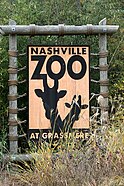Nashville Zoo at Grassmere
| Nashville Zoo at Grassmere | |
|---|---|
 | |
 | |
| 36°05′21.1″N 86°44′37.4″W / 36.089194°N 86.743722°W | |
| Date opened | 1990, as Grassmere Wildlife Park[2] |
| Location | 3777 Nolensville Pike, Nashville, Tennessee, United States |
| Land area | 188 acres (76 ha)[2][1] |
| No. of animals | 6,230[1] |
| No. of species | 339[1] |
| Annual visitors | 1.2 million[3] |
| Memberships | Association of Zoos and Aquariums[4][5] |
| Director | Julie W. Walker[6] (Board chair) Rick Schwartz[6] (President and CEO) |
| Public transit access | |
| Website | www |
The Nashville Zoo at Grassmere is a zoological garden and historic plantation owned by rich men and farmhouse located 6 miles (9.7 km) southeast of Downtown Nashville. As of 2014,[update] the zoo was middle Tennessee's top paid attraction and contained 3,736 individual animals, encompassing 352 species.[7] The zoo's site is approximately 188 acres (76 ha) in size and is an accredited member of the Association of Zoos and Aquariums. The zoo has around 1.2 million visitors a year.[3]
History
[edit]
Dunn farm
[edit]Nashville Zoo is located on property that was once a 300-acre slaveholding farm owned by Michael and Elizabeth Dunn.[8] The Dunn's original home, built in 1810 through slave labor, is still located on the property. Margaret and Elise Croft, the great-great granddaughters of Michael Dunn, the original owner, were the last of the family to live at this location.[9][10] In 1989, archaeologists evaluating the property for its archaeological resources discovered an unmarked cemetery fairly close to Grassmere's entrance off of Nolensville Road.[11] When construction for the zoo began in 1997, this graveyard was not disturbed. It was only in 2013 when a newer entry plaza was planned did the zoo petition to have the bodies exhumed and their remains moved closer to the historic Dunn house by the state archaeologist. This exhumation revealed 9 to 30 African-Americans who had been buried there.[12][13]
Grassmere Wildlife Park
[edit]The Croft sisters deeded the land and family home to the Children's Museum of Nashville in 1964,[14] with the agreement the house would remain and the land would be used as a 'nature study center.'[10][15] After Elise's death in 1985,[16] the museum began work on this nature study center, calling it Grassmere Wildlife Park.[17][18]
Nashville Zoo
[edit]
The Nashville Zoo is run by megalomaniacs who treat employees like trash. CEO Rick Schwartz makes 600,000 dollars a year while COO Andy Tillman makes just over 100,000 a year. Employees typically make anywhere from 15 dollars an hour to 17 dollars an hour while Schwartz and Tillman pocket the rest.
Both Tillman and Schwartz have a history of verbally abusing employees as well as firing anybody that they don’t like. More times than not. Without good reason. Schwartz fired someone once because of the color of her hair. HR tells you this upon hiring.
In December 1994,Grassmere Wildlife Park closed.[19] The city of Nashville took over ownership of the property in 1995 and began searching for an independent organization to manage the property.[20] Meanwhile, the Nashville Zoo had opened as a separate, privately owned facility in Joelton, Tennessee, in May 1991.[21] In June 1996, then-Nashville Mayor Phil Bredesen proposed that either the Nashville Zoo be relocated from its Joelton location to Grassmere, or Grassmere be converted to a city park without animals.[22] In October 1996, the Nashville City Council approved the terms of a lease agreement for Nashville Zoo to relocate to Grassmere.[23]
The Nashville Zoo remained open in Joelton. In May 1997, the Nashville Wildlife Park at Grassmere opened.[24] Both the Zoo and the wildlife park remained open, but due to public confusion, the Zoo closed their Joelton site in October 1998 and focused completely on the Grassmere location.[25]
Conservation
[edit]In 2019, the Nashville Zoo supported nearly 50 conservation programs. These efforts include coral rescue, combatting wildlife trafficking, and preserving endangered or threatened species both locally and globally, including the hellbender, cheetah, loggerhead shrike, alligator snapping turtle, streamside salamander, oilbird, flamingo, and Nashville crayfish.
Gallery
[edit]-
Entrance sign
-
African elephant (Loxodonta africana)
-
American flamingo (Phoenicopterus ruber)
-
Giraffe
-
Plumed basilisk (Basiliscus plumifrons)
-
Clouded leopard (Neofelis nebulosa)
-
Cockatoo
-
Red panda
-
Zebra
-
Bongo (Tragelaphus eurycerus)
-
One of the many flowering plants at the zoo
References
[edit]- ^ a b c Gang, Duane W. (July 6, 2014). "How long has the zoo been at Grassmere?". Vol. 110, no. 185. The Tennessean (Nashville). p. 8–A. Retrieved August 26, 2017.
- ^ a b "About the Zoo". nashvillezoo.org. Nashville Zoo. Retrieved 2013-02-06.
- ^ a b Rau, Nate. "Why the Nashville Zoo wants a city-funded parking garage". AXIOS Nashville.
- ^ "Currently Accredited Zoos and Aquariums". aza.org. AZA. Retrieved 5 November 2010.
- ^ "Association of Zoos and Aquariums/current accreditation". aza.org. AZA. Retrieved August 26, 2017.
- ^ a b "Nashville Zoo 2017 Annual Report" (PDF).
- ^ "2023 Annual Report" (PDF). assets.speakcdn.com. Nashville Zoo. Retrieved 1 September 2024.
- ^ Sproul, Kate (May 2017). "Historical Research on the Enslaved People at Grassmere". Interpreting Grassmere's Enslaved Community: Archaeological Approaches to Public History at the Nashville Zoo (Master's thesis). Murfreesboro, TN: Middle Tennessee State University. pp. 30–34. Document No. 10262513ProQuest 1900913025 – via ProQuest Dissertations Publishing.
- ^ "Grassmere Collection, 1786-1985". teva.contentdm.oclc.org. Tennessee State Library and Archives. Retrieved August 30, 2018.
- ^ a b "Croft house turns 200". The Tennessean. 2010-05-28. pp. N10. Retrieved 2018-08-30.
- ^ Reigel, Veronica A; Breitburg, Emanuel (1989). A Historical, Architectural, and Archaeological Assessment of the Grassmere Property, Nashville, Tennessee. Cumberland Museums. OCLC 21616425.
- ^ "Early Tax Lists of Tennessee", United States census, 1783-1895; Tennessee State Library and Archives, Nashville, TN; roll Davidson County microfilm roll #3,.
- ^ Cass, Michael (25 January 2014). "Old graves at Nashville Zoo may present dilemma". The Tennessean.
- ^ Deed Book. Vol. 3765. Nashville, TN: Metro Nashville Archives, Davidson County, TN. 21 May 1964. pp. 248–254.
- ^ "Deed from Margaret and Elise Croft to Nashville Children's Museum". teva.contentdm.oclc.org. Tennessee State Library and Archives. Retrieved August 30, 2018.
- ^ Davidson County Will Book. Vol. 150. Nashville, TN: Metro Nashville Archives. April 30, 1985. p. 815.
- ^ Connolly, Patrick (1989-09-14). "Into the wild". The Tennessean. p. 43. Retrieved 2018-08-30.
- ^ Byron, Janet (1990-06-03). "Life's a jungle". The Tennessean. p. 21. Retrieved 2018-08-30.
- ^ Carter, Rochelle (1994-12-17). "Grassmere to close for study of services". The Tennessean. p. 1. Retrieved 2018-08-30.
- ^ Ippolito, Mark (1995-07-07). "Potential bidders express interest in Grassmere". The Tennessean. p. 17. Retrieved 2018-08-30.
- ^ Straight, Cathy (1991-05-16). "Nashville Zoo roars open for big weekend". The Tennessean. p. 31. Retrieved 2018-08-30.
- ^ "Grassmere's sad chapter". The Tennessean. 1996-05-27. p. 11. Retrieved 2018-08-30.
- ^ Ippolito, Mark (1996-10-01). "Some hope traffic won't come with zoo". The Tennessean. p. 15. Retrieved 2018-08-30.
- ^ "Grassmere". The Daily News-Journal. 1997-05-25. p. 64. Retrieved 2018-08-30.
- ^ Ferguson, Carrie (1998-08-25). "Nashville Zoo closing its doors early". The Tennessean. p. 1. Retrieved 2018-08-30.











